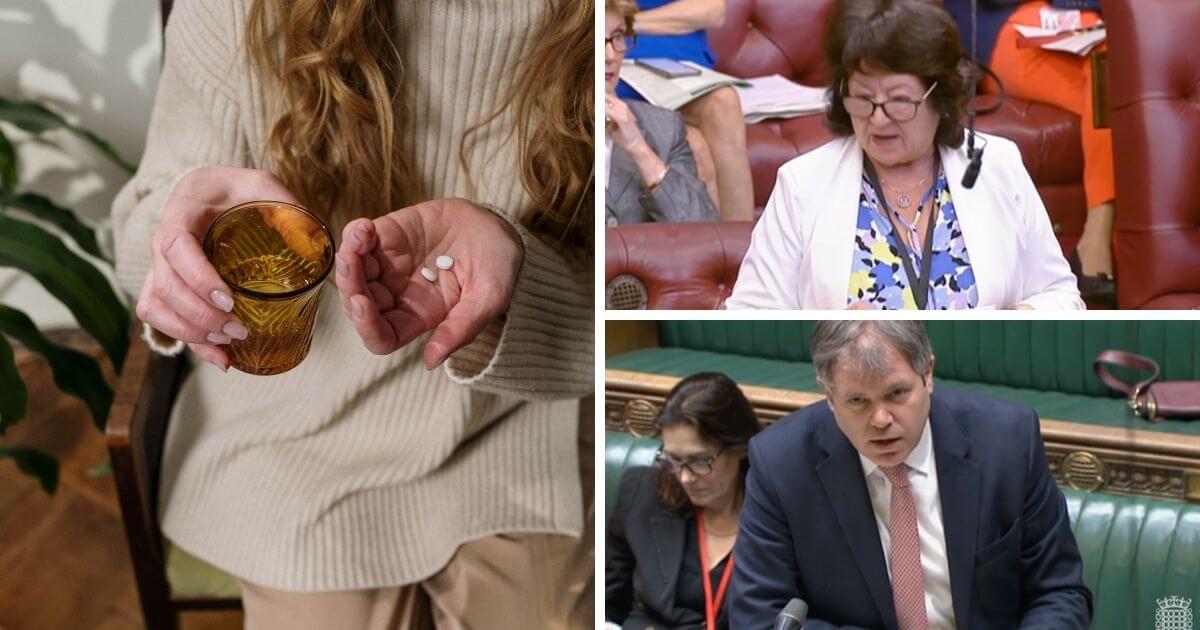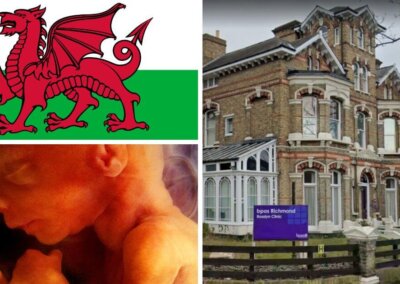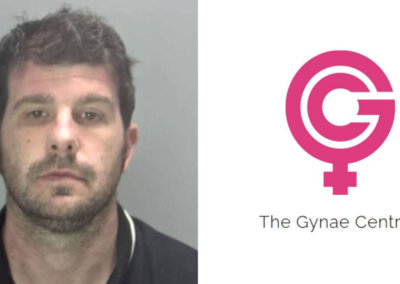MPs and Peers have called for the reinstatement of in-person consultations before medical abortions after campaigners exploited the distressing case of an eight-month abortion to call for its legalisation up to birth. Following the tragic news earlier this week of a woman using illegally-obtained abortion pills to abort her baby, Lily, at around 8 months gestation, pro-abortion parliamentarians questioned the Government in both the House of Commons and the House of Lords in an attempt to push for the legalisation of abortion up to birth.
Carla Foster, 44, used the British Pregnancy Advisory Service’s (BPAS) “pills by post” scheme to obtain abortion pills during lockdown when she was 32-34 weeks pregnant. Abortion is available in the UK up to 24 weeks gestation, but ‘DIY’ at-home abortion (when pills are posted to the woman after a telephone consultation) is only available up to 10 weeks. Ms Foster pleaded guilty to a charge under section 58 of the Offences Against the Person Act (OAPA) 1861: administering drugs or using instruments to procure abortion.
Today, pro-choice parliamentarians, Diana Johnson MP and Baroness Thornton, each asked the Government for statements concerning the recent prosecution under the OAPA, in an attempt to call for the repeal of Section 58 of the Act. As the Abortion Act 1967 was passed to create exemptions to 58 and 59 of the OAPA along with the Infant Life Preservation Act, fully decriminalising abortion through repealing these two pieces of legislation would make the Abortion Act 1967 redundant in England and Wales.
This change in law would scrap the current 24-week time limit for abortion, and abortion would be available on demand, for any reason, up to birth. The upper time limit would be completely abolished.
Peers call for reinstatement of in-person appointments
In the House of Lords, following an oral question from Baroness Thornton about section 58 of the OAPA, Baroness Eaton asked the Government to “urgently propose legislation to reinstate the requirement for women to be seen in person at least once before being prescribed abortion pills” in order to prevent such tragic offences from occurring again.
Even pro-abortion peer, Baroness Gale, while arguing that abortion access should be a human right, said that more information should be available “so that situations that happened during COVID lockdown, where women and girls did not have face-to-face access to their GP consultations” never happen again.
Pro-life MPs warned ‘DIY’ abortions would lead to tragic cases
In the House of Commons earlier this morning, in response to Diana Johnson MP’s urgent question, Sir Edward Leigh MP highlighted that, when the House of Commons debated the removal of in-person appointments last year, MPs warned that there might be tragic cases like these and that the abortion industry is now using this disturbing case to argue for abortion up to birth. He said that since many babies survive at 24 weeks, “this is an obscene and cruel proposal”, and suggested the solution would be to return to in-person appointments so that gestational age can be more accurately determined.
Sir Desmond Swayne MP reinforced this, insisting that “this tragedy would not have occurred had there been a requirement for a face-to-face consultation and clinical administration of the drugs”.
Bob Blackman MP agreed that “regardless of one’s views on abortion, surely it must be that those women seeking an abortion get proper medical advice so that their health [and] the health of the unborn child are protected”.
Martin Vickers MP said that he found it distressing that there was so little concern expressed for the welfare of the unborn child and that the Government should, at the very least, “review the regulation of the providers who send out these pills”.
Jim Shannon MP refuted Diana Johnson’s claim that section 58 of the OAPA should be repealed simply because it dates from 1861, by asking if she would like to repeal the entire Act since it all dates from 1861. He continued by pointing out that section 58 provides “vital protection … for the most vulnerable person of all: the unborn child” and asked the Government to “urgently review safeguards to the ‘pills by post’ scheme to ensure that such a case doesn’t ever happen again”.
Nick Fletcher MP reminded the House of the humanity of the unborn baby by explaining that “after six weeks old, these babies are fully formed; it’s just a case of them actually growing like we continue to do when we’re outside the womb”.
Minister highlights current UK law out of step with rest of Europe
The Minister of State for Victims and Sentencing, Edward Argar MP, said, in response to a question about the differing laws in Europe, that the 24-week time limit for abortion in the UK is much higher than most European countries, where the most common time limit is 12-14 weeks.
BPAS shirking responsibility and calling for abortion up to birth to be introduced
Rather than take responsibility for sending out abortion pills 22 weeks beyond the legal limit for at-home abortions and risking the health of the mother as well as her unborn child, abortion provider BPAS is now cynically using this woman’s tragic experience of its abortion service to lobby the Government and MPs to introduce abortion up to birth throughout the United Kingdom.
BPAS has been campaigning for this law change and has made it explicit that it is campaigning to remove all gestational time limits for abortion. This position was affirmed by its then CEO, Ann Furedi, who, at the launch of the campaign to ‘decriminalise’ abortion stated, “I want to be very, very clear and blunt … there should be no legal upper limit”.
BPAS lobbied for in-person appointments to be removed despite evidence that these could result in late-term abortions taking place at home
In-person appointments had previously been required ahead of a medical abortion taking place, but BPAS successfully lobbied the Government to have them removed during the pandemic.
It then became clear that women were not accurately estimating their baby’s gestational age at home, along with a number of other safeguarding issues arising from the introduction of at-home abortion.
Medical professionals, 70% of respondents to a Government consultation and MPs, including Miriam Cates who specifically mentioned risks around inaccurate gestational estimates, called for a reinstatement of in-person appointments after the Covid pandemic. The Government then decided to reinstate them.
BPAS then joined prominent pro-abortion MPs to support an amendment to the Health and Care Bill to overturn the Government’s decision to reinstate these appointments. The amendment passed by a narrow margin of 27 votes.
Right To Life UK spokesperson, Catherine Robinson, said:
“We are joining Parliamentarians in calling for the reinstatement of in-person appointments before abortions take place to ensure that the gestational age of babies can accurately be assessed”.
“We are also calling for a full inquiry into the abortion provider, the British Pregnancy Advisory Service, for sending out abortion pills to a woman whose baby, Lily, was 22 weeks beyond the legal limit for at-home abortions”.
“The Government must firmly reject the introduction of legislation to make abortion legal right up to birth, as is proposed by abortion campaigners, led by BPAS, who are exploiting this tragic case to call for the removal of more abortion safeguards and the introduction of abortion up to birth across the United Kingdom”.
“At 32-34 weeks or around 8 months gestation, Baby Lily was a fully formed human child. If her mother had been given an in-person appointment by BPAS, her gestational age would have been accurately identified by ultrasound or a physical examination and she would still be alive”.
“Rather than take responsibility for sending out abortion pills 22 weeks beyond the legal limit for at-home abortions and risking the health of the mother as well as her unborn child, this same abortion provider, BPAS, is now cynically exploiting this woman’s tragic experience of using its abortion service to lobby the Government to introduce abortion up to birth”.
“This proposal is completely out of line with where women stand on the issue. Polling from Savanta ComRes on whether time limits for abortion should be increased showed that only 1% of women in Great Britain wanted the time limit to be extended to more than 24 weeks and 1% wanted it to be increased right through to birth, in contrast to 70% of women who favoured a reduction in time limits.”












